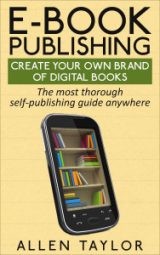Add Book Publishing Consultant to My List of Pro Credentials

Infographic: 7 Types of Authority Content

Google+ And Me: Why I Deleted My Account
For 13 years now, I’ve been operating mostly as a lone freelancer. For some of that time, I was chief operations officer of a content production company that produced low-priced SEO articles and blog content at high volumes. We also created websites, landing pages, and other content for cheap Web entrepreneurs who wanted a dressed up full moon at Polaroid reprint of craters-at-midnight prices. I learned a lot from that experience, mostly to stay away from cheap entrepreneurs in search of a dressed up full moon at Polaroid reprint of craters-at-midnight prices.
I started Taylored Content in 2013 and formally filed as an LLC in January 2018. My specialty is authority content, which means high-octane blog posts that are well-researched, well-written, and covers its subject matter with depth, book and e-book content, white papers, authority articles, infographics, and any other content designed to position its author as an authority in their subject. Of course, that implies that my clients already be authorities in their subjects. My job is to help them produce the content that proves it.
In addition to producing this kind of content for my clients, I try to do it for myself too. There have been times, however, when the shoemaker’s shoes had to run bare foot. Not today.
 Since my specialty is producing authority content, I put together a free report that discusses 14 types of authority content. I’m currently revising it and expanding the types of authority content to 15. You’ll be able to download this revised free report within the next month. I’ll let you know when.
Since my specialty is producing authority content, I put together a free report that discusses 14 types of authority content. I’m currently revising it and expanding the types of authority content to 15. You’ll be able to download this revised free report within the next month. I’ll let you know when.
On top of that, I’ve also written an e-book on e-book publishing. This e-book is a nuts-and-bolts how-to for people who really want to do their own book publishing. It covers, step by step, how to format an e-book in the various formats using some of the popular software designed for that purpose. I haven’t updated it in a while, so some of the information might be out of date, but I stand by the process at any rate. That is, if you want to do your own formatting and don’t want to hire someone else to do it for you (as I do now).
Additionally, I’ve edited three multi-author fiction anthologies and written a novella in the fantasy fiction genre. I saw all four of these books into print as trade paperbacks and e-books, however, I did none of the nuts and bolts work myself. I hired an original cover artist for the three anthologies, used a Fiverr artist for the fantasy novella, and used a professional book formatter for all three products. I think it’s safe to say I understand the independent book publishing process from beginning to end. That’s why I’m proud to make the following announcement.
I Am Now Officially a Book Publishing Consultant
In August last year, I had a potential client contact me to assist him with writing a nonfiction book. He already had the notes, the basic story line. I served as editor to spruce it up, make the story flow, get the language succinct, and so on. Then the project was done and I handed him his file. He went on vacation over the holidays.
After a week or so, I emailed him to see if he needed any more assistance and offered to help see the book into print if he needed me to. When he returned from vacation, last week, he responded. We talked it over today on a Web conference call and decided I’d oversee the process to the end. That means hiring a book cover artist, formatter, and handling all the other details to get his book into print and ready to be sold, or handed out as a calling card as the case may be (this is actually his intention as he is a world-renowned public speaker). We signed the scope and work (SOW) this afternoon. Here are the details of the SOW.

As you can see, identifying information of the client has been redacted, but you can see the type of project and the scope as “manage the publishing process of (a) book.”
The next three sections of the SOW are rather innocuous, but important, as they define the parties to the agreement, the length of the project, and the payment. The meat of the project’s scope is in the section titled “Content Schedule” because I typically use this SOW to define writing projects. It served its purpose for this project, as well.

This SOW effectively makes me a project manager, but it’s a very valuable expertise for the client. Neither he nor his assistant have any experience in publishing books. They have plenty of sales and marketing experience, which will come in handy later when they want to sell copies on Amazon and other venues.
This is the type of project I’d like to get more of this year. I see this as an opportunity to call myself an Authority Publishing Consultant. Catchy title, don’t you think?
Looking for content for your blog?
Call or email today.


